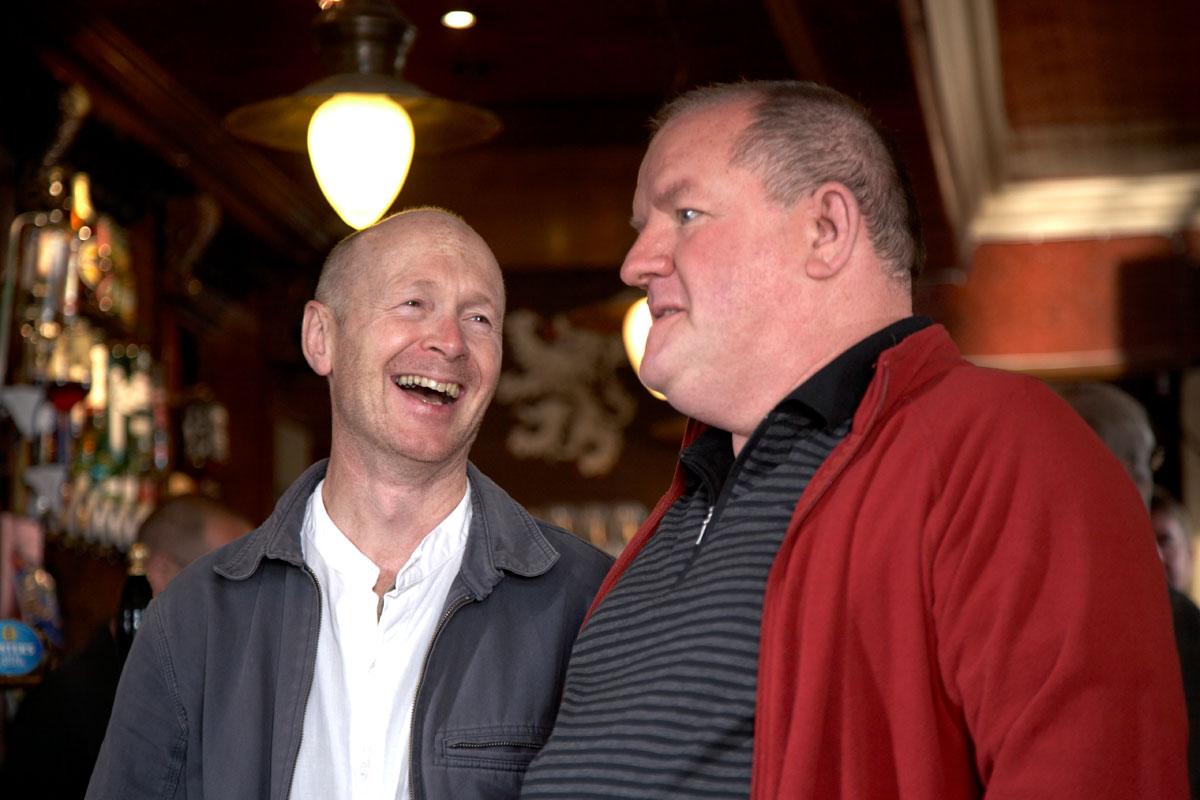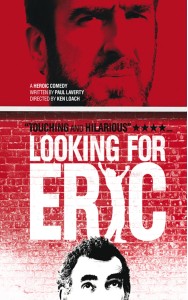What was the most difficult aspect of the script?
Imagining the main characters and central premise is always key to any story. Although there is a jocular tone between little Eric and Cantona, I was deadly serious about trying to envisage both Eric Bishop’s detailed history and mental state when we join him. Incidentally, in the script when we open Eric is actually stuck on a roundabout going round the wrong way again and again. Unfortunately, on the opening day of filming the stunt driver made a mistake and collided with Eric’s car on the first loop. We were very lucky no one was seriously hurt. Ken had bruised ribs for a couple of weeks and Barry got a knock too. (Director of Photography) Maybe this shows it is much easier to write a script than make the film.
Although Eric Bishop pretty much came to mind in a flash we were really keen that his psychological condition was absolutely coherent. The comedy only works if we are entirely serious about his pain. I read many books which were helpful, especially one by Andrew Solomon called The Noonday Demon. It is quite brilliant. He analyses himself with impressive honesty and insight and does an entire overview of the condition, even going back to the ancient Greeks. It is clear Eric is not in a deep depression otherwise he would not have been able to get out of bed, but he is certainly going through a significant crisis in his life.
I came across another book called Instant Confidence. I found it one day browsing in the Self Help section, (which is where I think the character Meatballs came to mind) but it should have been in Comedy. I had imagined Big Eric just appearing one day to little Eric by his cut out poster, but when I came across the ‘Possibility Generator’ it did make me laugh out loud. ‘Now, go over to your role model and float into their body and synchronise with their posture. See through their ears and feel how confident they feel.’ I could just see little Eric scoring that goal against Sunderland. I sensed this might make for a terrific scene for the postmen and Meatballs. The actor John Henshaw and his fellow stand-ups were brilliant and made it their own. And all credit to the author of the book for letting us take the piss so much.
I spoke to several pals in Glasgow who are health professionals who spoke at length about their work. I also met a Doctor Thedor Mutale, a psychiatrist who often did assessments for the police if someone was detained in a moment of crisis similar to Eric’s. In addition to all the usual questions about self care, about suicide – and a real plan to carry that out, not just the general inclination, Thedor often asked a question that really fascinated me. ‘Have you ever done something you are ashamed of?’ That question went round my head for days and opened up all sorts of doors into Eric’s past.
I also spoke to several people about treating panic attacks, and one person in particular who was incredibly open and insightful about his own experiences. I also met many impressive people through the Hearing Voices Network who were incredibly generous with their time and eloquent about their lives.
Eric Bishop is not based on any one of the above, but somehow getting the terms of reference in my head is really important on how to pitch the character at a precise spot. At least it gives me many more choices when I come to write. Eric is a complicated character. Although he’s obviously fragile, tells lies, hides, can’t say ‘No’- unless it’s in French - and in danger of a total breakdown, he does have reserves of strength and courage. I thought Steve Evets played the contradictions beautifully. There is not a moment I don’t believe him. I am of course not objective, but I think it is one of the best central performances I have seen in years.
What about Lily, Eric’s first partner?
I liked the idea of them meeting up at the dancing. To touch takes confidence. It makes for a massive contrast when we join them almost 30 years later. I’m intrigued by the idea that there are many versions of ourselves as we grow older. They have connected in a very profound way at very young stage of their lives. What makes it special is that they know in their heart it is mutual. The intensity of that first youthful encounter is ingrained in their memory for life. Quite apart from physical ease between them I suspected Eric made her laugh and he was attracted to her brightness. But to be left abandoned with a child by somebody you love is a shattering blow. Lily was nearly crushed by that. She had to find herself again too, but at a much earlier stage of her life. One of life’s great challenges is to bring up children, but to do it on your own is so much more difficult and I have the deepest of respect for single parents.
Lily has grown. Eric is stuck. Some select few are artists with their own lives – they are content and have learned to live life to the full. She tells Eric at one point ‘I have chosen a simple life, but it’s mine.’ They nourish themselves and others round them in everything that they do. I have met grandparents like that. Lily is quite special because of her generosity. A different character would have been embittered for ever – and that’s understandable and very human, but I think Lily has had the talent and the determination to rebuild her life. It doesn’t mean that she’s not scared of being hurt again. There is a chasm of distrust and many years to bridge, but she is still her own woman and has the insight to sense Eric’s weaknesses. Despite all the mistakes and ‘water under the bridge’ there is still a singular connection between them that vies with what separated them. Little wonder Eric wants to be able to look her in the eye again and feel she’s not just being sorry for him. I think Steph (actress playing Lily) radiates generosity without even trying.
What about Ryan and Jess, Eric’s stepsons?
With Lily the film looks both to the past and the present. With the boys, and their daughter Sam, the narrative projects forwards. I hope it helps balance the story. I worked out Eric’s relationship in some detail with his second partner Chrisie, but little appears in the screenplay and even less in the film. Cinema has its own iron discipline and we usually only have two hours to play with. As a result a great deal must be implied, but that too must be coherent.
Eric is particularly loyal to his step-sons, given the conditions. We had to cut several scenes because they were just too long, but in one exchange between Eric and Lily, the latter says they were ‘not your kids.’ Eric responds sharply, ‘Yes they are…the day Chrisie walked out I promised them both I’d look after them…no matter what. Maybe I was trying to make up for Sam…’
When we join Eric he feels he has turned into a doormat and doesn’t have the strength to confront them. In addition, the outside world comes flooding through the letter box and sweeps into the living room. Where we live changes our lives, and parents are just one element in the mix.
Gun culture has blighted some communities in Manchester and I spoke to some wonderfully creative and determined parents there who were trying to change things. Can you imagine the shock a mother feels when she discovers her teenage son is wearing a bullet proof vest? Or someone is shot dead because of a perceived insult? I also have a very close friend Stevie Sklair who lived many years in Brixton. His insight and experiences too were precious and helped enormously when I came to write the script.
Sounds like you talk to lots of people before writing a script?
Some writers spend most of their times in their rooms. Each to their own. I spent my formative years in seminary taught by priests where the ‘outside’ world was painted boldly in black and white. It has left me with an incurable curiosity for other worlds, and other ways of looking at it. Grey is the most fascinating colour of all. I love getting out and digging around. A lot of the ground work is investigative – a time of constant dialogue with Ken too, before the very private part, writing the script itself. But you can’t copy a script from the street, and you must be loyal to your characters, as they emerge, even though they are just ephemeral creatures, full of contradictions, fighting for space in the mind.
You are always hopeful for a little bit of inspiration and God knows where it might come from. It’s that ‘trumpet moment’ with Big Eric, or that fleeting glance of a scrawny little grandfather on the terraces slipping between his own fingers. You see it for what it is, but suddenly it opens up to become something much more. It’s a pleasurable rush. I once heard a famous inventor say ‘Chance favours the prepared mind.’ I think a lot of writing is making connections, and the more raw material you have, the more creative choices you have. So do the work, collaborate with your mates, and waggle those tendrils to the neurones and hope for the best. I am particularly fortunate – quite apart from my long working relationship with Ken who is the most challenging and encouraging of partners, supported by Rebecca, (producer) just look at the credits to this film and see how much talent has come together to work time and time again. Each one vital to the film, but given my role, I must mention Roger Smith, script editor, who has been a terrific collaborator. We all have different jobs but meet up as film makers. Lucky bastards is all I can say.

